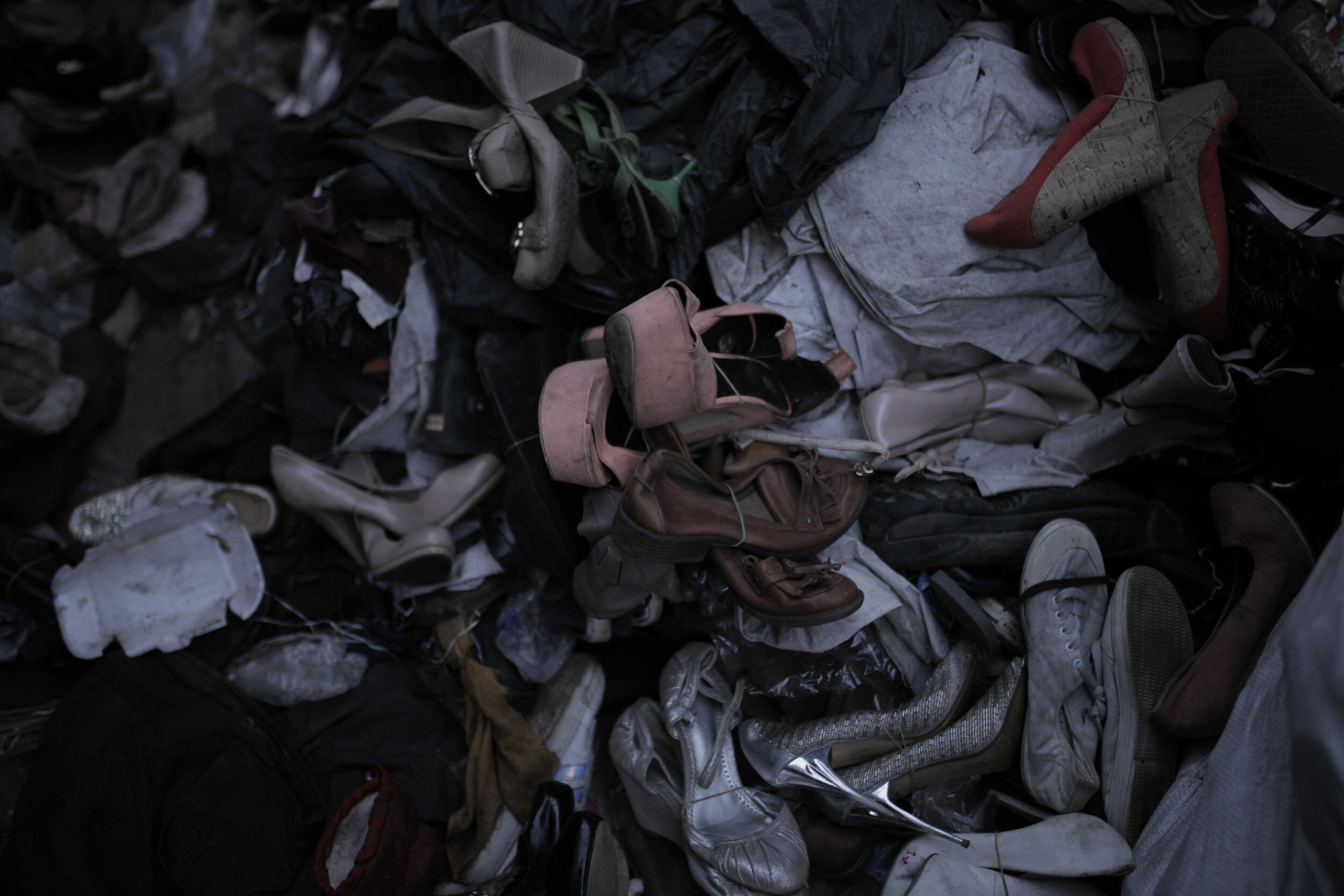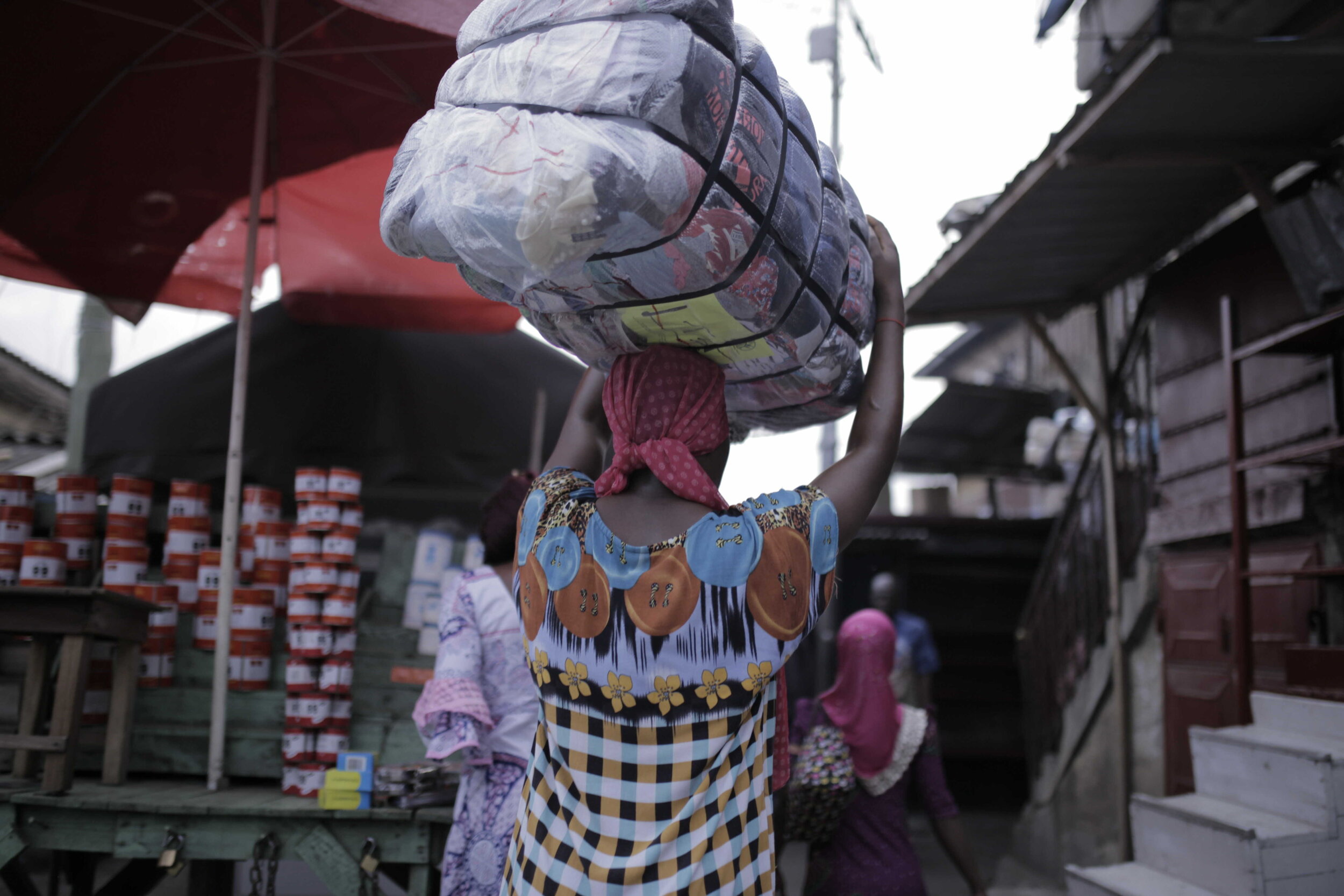Liz Ricketts: The truth about what happens to second-hand clothing
5 am on a typical day. Liz is already at the Kantamanto Market in Accra, Ghana. She’s chatting to the retailers as they sort through the clothes that have arrived that day.
Liz is the co-founder of The OR Foundation and driving force behind the research project Dead White Man’s Clothes. It explores the second-hand clothing industry in Accra, the final destination for millions of garments discarded in the UK, USA and Canada. The project’s name comes from the Ghanaian term for these clothes, obroni wawu, which means ‘the white man has died clothes’. The expression implies that the original owners of these clothes must have died to give up so many perfectly good garments. Something which we know not to be true.
The truth about fast fashion
Before The OR Foundation, Liz knew a different life as an NYC fashion design student. She dreamt of working for a luxury label until she saw the industry she loved go into overdrive. Luxury brands going from two to four collections per year to compete with fast fashion’s constant newness. She also saw the substance abuse and mental illness that plagued designers: the human cost of this enormous workload.
Liz realised, if the people at the supposed top of the supply chain are suffering this much, what else is going on that we don’t know about? She made it her mission to find out.
But Liz’s enquiries went unanswered. No one knew anything about the factories making their garments. No one had visited them. This left her feeling even more uncomfortable. The more she dug, the more she uncovered the darkness beneath the fashion industry’s glitzy surface.
As a graduate, Liz found work that spread positivity in the industry: image consultation for the visually impaired, fair trade fashion and upcycling projects. It was whilst in Ghana for work that she first saw the mountains of second-hand clothing in Kantamanto and decided, once again, to dig deeper.
Liz discovered that the idea of second-hand clothing as a commodity and livelihood to retailers in Africa? It’s a myth. Only a few retailers in Kantamanto earn enough to transcend economic barriers. And with growing competition from modern shopping centres and the internet, this number is falling all the time.
In this system, those who risk the most stand to benefit the least. The global North is free to continue consuming while the global South manages the waste. Most of what ends up in Kantamanto is low-grade clothing, nearly half of which ends up in landfill.
A new perspective on sustainability
Liz’s goal with The OR Foundation was to bring a new voice to the sustainability conversation in the USA, meanwhile equipping retailers in Ghana with data that can help their businesses thrive.
In the USA, that means presenting in-depth field research to students of all ages and disciplines. Liz helps people relate to the situation in Accra on a more personal level, closing the gap between the Americans that throw these clothes away and the people in Ghana that sell or wear them.
One such example is Kevin the jeans bale. The Foundation purchased Kevin (named after the importer’s son) to demonstrate what happens when clothing arrives in Kantamanto.
The bales are packed by garment type and contain around 200 items each. Bales are priced based on their weight, garment type and country of origin. The average bale costs around £100, less from the USA and Canada, more from the UK. The first job for the buyer of the bale is to split the contents by quality. They will sell the good items at the market, the bad items will go to the landfill, earning them nothing. Every bale is a gamble. Will there be enough quality product to make a return on their investment?
Liz gave Kevin the jeans bale to three retailers. They all agreed Kevin was a bad bale. They wouldn’t have made their investment back. Now, Kevin travels as an exhibit with The OR Foundation, a tangible example of the 40,000 bales that arrive in Kantamanto every week.
Overconsumption is a sickness
Liz, like many of us, grew up in a place where waste was ‘out of sight, out of mind’. She has learnt what a privilege that is after working daily amongst the waste from which so many people make a living. She says it has made her more careful back home. “I find joy in mending things now,” she says.
As a former fashion design student, her relationship to clothes has done a 180. “I used to engage with fashion on a superficial level,” she says. She saw style as social capital, an art form. But Liz doesn’t shop as much anymore. When she does, it’s for things she wants to keep for a very long time. “I don’t say I never buy anything. But I buy things I feel connected to because of where it’s from or who made it, not because of how I look in it.”
She identifies with the struggle for consumers to know and understand the supply chain of every item they buy. “It’s overwhelming,” she says. Instead, she advocates for keeping the clothes we do buy for longer. “Look at them in a new way. Take them to a tailor, mend, sew or overdye them.
“Within our culture, we’re taught that we’re lacking. Our most important role is that of consumer,” she says. “We’re consumers before we’re even citizens.” She believes this needs to change if we’re to win the war on fast fashion. “Overconsumption is a sickness,” she says.
She suggests taking stock of our mental health before we hit the ‘Buy’ button. Reflect on why we feel we need something new and identify why we might feel a ‘lack’ that isn’t really there. This way, we can change our relationship to clothing, buying only what we need and what we’ll actually wear. Because even something with all the right labels and ethical credentials is useless if it doesn’t get worn.
Women empowering women
Liz sees gender equality as the key to a brighter future: “The most impactful solutions for our planet come down to empowering women.” She also believes in the power of intergenerational communication – combining the revolutionary spirit of the younger generation with the experience of the older generation.
The OR Foundation has developed strong relationships in Kantamanto. They have a tangible hold on what is going on in Accra and what they can do about it. As a small organisation, they can remain agile to focus on the pressing issue of the moment.
Liz’s next area of focus will be the health of the Kayayei, mostly women whose job it is to transport huge bales of clothes on their heads. She wants to arrange registration for healthcare, vaccinations and education on their rights. And she is preparing to conduct research into the impact these bales – some of them up to 200lbs – have on their bodies.
Long-term, the team is looking at on-site fibre recycling. This would give retailers the power to turn waste from poor bales into recycled fabric, creating a new profit opportunity and reducing the amount that ends up in landfill. At first, this would be used for mattresses and furniture. Although it’s Liz’s hope that eventually, these fibres will feed the local textile industry.
But there’s one thing Liz is very clear on: the demand for this circular industry must come from Ghana itself and cannot be another imposition from the global North to enable continued overconsumption.
Follow Liz on Instagram or find out more about Dead White Man’s Clothes and Kevin the jeans bale.
Images courtesy of Liz Ricketts and The OR Foundation




